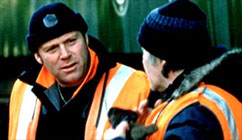|
|
|
|
The Navigators
|
 |
|
One
of the best pieces of feedback I have ever received as a critic was from an
elderly cab driver. When he realised (incredibly
enough) who he had in his car, he braked in the middle of a street and cried
out: “My wife and I agree … that you are an anti-realist!” No worse
insult, it was clear, could have passed his lips.
His
main evidence for this slander turned out to be my publicly expressed attitude
towards veteran British filmmaker Ken Loach (Kes [1969], Days of Hope [1975]). But I was indeed guilty as charged. For a long time, I dismissed
Loach’s work and his significance as a director.
At
least I was not alone. For at least 20 years, from about 1975 to 1995, Loach
was the uncoolest name in film culture. Associated
with the dreaded school of kitchen sink realism and tagged as an old-fashioned,
out-of-date British lefty, he was abandoned by critics who considered
themselves to be sophisticated and modern.
That
abyss yawned wide. Asked, at one point during this period, whether he was
interested in debating the formal intricacies of political cinema (which is
where “the discourse” had migrated to by then), Loach responded that he would
rather have people discussing the social issues his films so urgently and
angrily raised.
Unfazed,
Loach simply kept making one committed film or TV program every year. But then,
a curious shift occurred. Many who had hitherto studiously ignored Loach
(myself included) suddenly began eulogising him. Was
it because some of the most acclaimed films of the late ‘90s about working life
– by Laurent Cantet (Human Resources, 1999) or the
Dardenne brothers (Rosetta, 1999) – were so obviously and undeniably Loachian?
Who
really changed in this scenario, Loach or his audience? There is no doubt that
a film such as Carla’s
Song (1996) represented an artistic breakthrough. His characters
ceased being ciphers in rigged, schematic storylines. Finally, the personal and
the political meshed in a rich, satisfying way, in works including My Name is Joe (1998).
But,
even at his clunkiest, Loach had always been a unique director. And belatedly,
critics realised that the drama and banter, the clashes of private and public,
the jagged narratives and suspended resolutions in his movies demanded
attention as a cinematic art and craft almost on par with that of Roberto
Rossellini or John Cassavetes.
The Navigators – subtitled
“Stories from the Trackside” – spins a web of incidents around the
privatisation of the British rail industry in the mid ‘90s. Its writer, Rob
Dawber, both lived these events and died (from asbestos poisoning in 2001) as a
result. It is an intense, compassionate account with pointed relevance to many
societies today.
Paul
(Joe Duttine), Mick (Thomas Craig), Len (Andy Swallow) and Gerry (Venn Tracey)
are co-workers on the railways. Loach paints them in all their human diversity
– some are politicised, others just want to be left alone to pick up their
paycheck (this is just the type of social-temperament panorama that Mike
Leigh handles so badly). As working conditions unravel, the mates find themselves
confronting increasingly difficult situations.
The
film’s tone shifts throughout, in engaging and subtle ways. Dramatically, it’s
prototypical consciousness-raising fare – and it works perfectly well on that
level. But casting singers and comedians in the central parts allows Loach to
bring out the rich, sometimes sadistic humour of the
British working class. Eventually, when we reach the story’s disturbing final
movement, there is even a touch of noir.
The Navigators is classic Loach.
His feverish nostalgia for the universal brotherhood of workers (Dawber was a card-carrying Trotskyite) might be queried,
but the analysis of the system’s ills, and how they impact on ordinary lives,
is – as usual – spot-on. Dear Mr Taxi Driver, you can
drive me all the way home now, after all!
MORE Loach: Ae Fond Kiss, Raining Stones, Sweet Sixteen © Adrian Martin August 2002 |
![]()